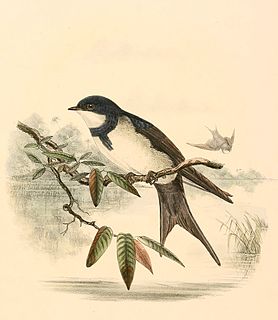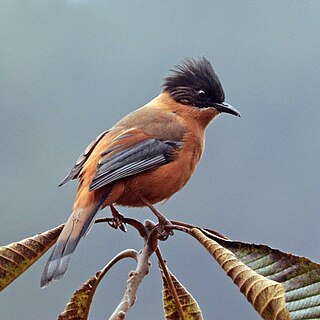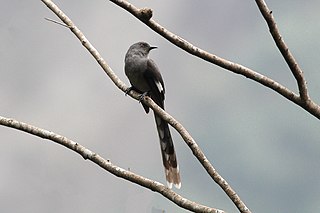
The Cyprus wheatear or Cyprus pied wheatear is a small, 14–15 cm long passerine bird that was formerly classed as a member of the thrush family Turdidae, but is now more generally considered to be an Old World flycatcher, Muscicapidae. It was formerly treated as a subspecies (race) of pied wheatear but Sluys and van den Berg (1982) argued that the form deserved full species status, on the basis of differences in biometrics and especially song, and the lack of sexual plumage dimorphism in cypriaca.

The greater yellowlegs is a large North American shorebird. The genus name Tringa is the New Latin name given to the green sandpiper by Aldrovandus in 1599 based on Ancient Greek trungas, a thrush-sized, white-rumped, tail-bobbing wading bird mentioned by Aristotle. The specific melanoleuca is from Ancient Greek melas, "black", and leukos, "white".

Leiothrix is a genus of passerine birds in the family Leiothrichidae. They belong to a clade also containing at least the liocichlas, barwings, minlas and sibias. The sibias are possibly their closest living relatives.

The wonga pigeon is a pigeon that inhabits areas in eastern Australia with its range being from Central Queensland to Gippsland, eastern Victoria, Australia.

The red-billed pied tanager is a species of bird in the family Mitrospingidae. It is found in Bolivia, Brazil, French Guiana, Guyana, Peru and Suriname. Placed in family Thraupidae, the "true" tanagers, for over two centuries, the International Ornithological Committee reclassified this species to Mitrospingidae in 2018.

The black-collared swallow is a species of bird in the family Hirundinidae. It is found in Argentina, Bolivia, Brazil, Colombia, French Guiana, Guyana, Paraguay, Suriname, and Venezuela. Its natural habitat is rivers.

The rufous-backed sibia is a passerine bird in the family Leiothrichidae.

Heterophasia, the sibias, is a bird genus in the family Leiothrichidae.

The white-eared sibia is a bird in the laughingthrush family Leiothrichidae. The species is sometimes placed in the monotypic genus Malacias. It was first described by Robert Swinhoe in 1864. There are no subspecies.

The rufous sibia is a rare species of bird in the family Leiothrichidae. It feeds on berries and insects.

The grey sibia is a species of bird in the family Leiothrichidae.

The black-headed sibia is a bird species in the family Leiothrichidae. In former times it was often included with the dark-backed sibia in H. melanoleuca. Together with most other sibias, it is sometimes separated in the genus Malacias.

The long-tailed sibia is a species of Leiothrichidae from Southeast Asia. The species was once placed in the large family Timaliidae, but that family is sometimes split with this species being placed with the laughingthrushes in the family Leiothrichidae. The species is sometimes treated as the only species in the genus Heterophasia, with the other species being placed in the genus Malacias.

The beautiful sibia is a species of bird in the family Leiothrichidae. It is found in China, India, and Myanmar.

The black-and-white triller is a species of bird in the family Campephagidae. It is endemic to the Philippines.
H. melanoleuca may refer to:
H. gracilis may refer to:

The laughingthrushes are a family, Leiothrichidae, of Old World passerine birds. They are diverse in size and coloration. These are birds of tropical areas, with the greatest variety in Southeast Asia and the Indian subcontinent. The entire family used to be included in the Old World babbler family Timaliidae.
















